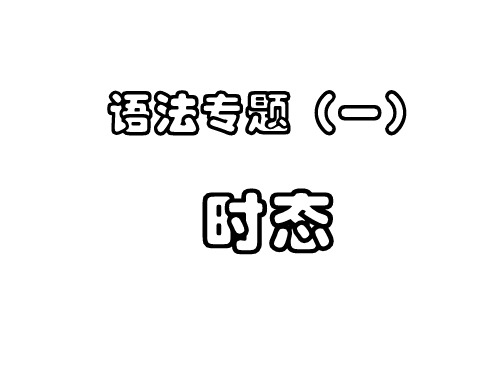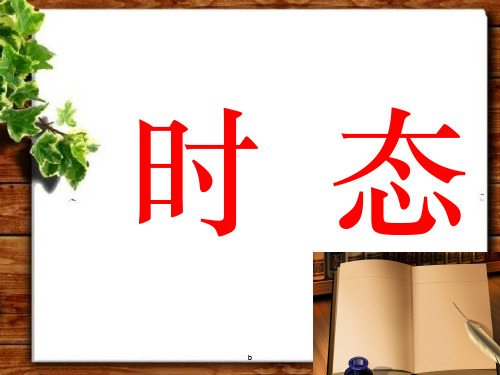一般过去时现在进行时一般现在时时态讲解、练习ppt课件
合集下载
一般现在时现在进行时和一般过去时和一般将来时态ppt课件

• I was not born in 1980. • Were you born in 1980?
经营者提供商品或者服务有欺诈行为 的,应 当按照 消费者 的要求 增加赔 偿其受 到的损 失,增 加赔偿 的金额 为消费 者购买 商品的 价款或 接受服 务的费 用
第二种
含有行为动词的
• 肯定结构 • 主语+行为动词(过去式)+其它
加es.如:study carry
练习:写出下列动词的三单形式
enjoyS stays plays stops runs
have has are is
经营者提供商品或者服务有欺诈行为 的,应 当按照 消费者 的要求 增加赔 偿其受 到的损 失,增 加赔偿 的金额 为消费 者购买 商品的 价款或 接受服 务的费 用
• 3)末尾只有一个辅音字母的重读闭音节,应先双 写这个辅音字母,再加-ed.
• e.g. shop-----shopped; stopped
• 4)以"辅音字母+y"结尾的动词,先把y变成i,再加ed. e.g. carry----carried; study------studied.
经营者提供商品或者服务有欺诈行为 的,应 当按照 消费者 的要求 增加赔 偿其受 到的损 失,增 加赔偿 的金额 为消费 者购买 商品的 价款或 接受服 务的费 用
prefer preferring
经营者提供商品或者服务有欺诈行为 的,应 当按照 消费者 的要求 增加赔 偿其受 到的损 失,增 加赔偿 的金额 为消费 者购买 商品的 价款或 接受服 务的费 用
一般过去时
•
一般过去时主要表示过去某时发生的动作或 情况
• 1态)。过去某个时间所发生的动作或存在的状
经营者提供商品或者服务有欺诈行为 的,应 当按照 消费者 的要求 增加赔 偿其受 到的损 失,增 加赔偿 的金额 为消费 者购买 商品的 价款或 接受服 务的费 用
第二种
含有行为动词的
• 肯定结构 • 主语+行为动词(过去式)+其它
加es.如:study carry
练习:写出下列动词的三单形式
enjoyS stays plays stops runs
have has are is
经营者提供商品或者服务有欺诈行为 的,应 当按照 消费者 的要求 增加赔 偿其受 到的损 失,增 加赔偿 的金额 为消费 者购买 商品的 价款或 接受服 务的费 用
• 3)末尾只有一个辅音字母的重读闭音节,应先双 写这个辅音字母,再加-ed.
• e.g. shop-----shopped; stopped
• 4)以"辅音字母+y"结尾的动词,先把y变成i,再加ed. e.g. carry----carried; study------studied.
经营者提供商品或者服务有欺诈行为 的,应 当按照 消费者 的要求 增加赔 偿其受 到的损 失,增 加赔偿 的金额 为消费 者购买 商品的 价款或 接受服 务的费 用
prefer preferring
经营者提供商品或者服务有欺诈行为 的,应 当按照 消费者 的要求 增加赔 偿其受 到的损 失,增 加赔偿 的金额 为消费 者购买 商品的 价款或 接受服 务的费 用
一般过去时
•
一般过去时主要表示过去某时发生的动作或 情况
• 1态)。过去某个时间所发生的动作或存在的状
初中英语八种时态讲解-课件PPT

什么情况下用?
①表示经常或习惯性的动作或存 在的状态。②表示主语通常的能 力、兴趣爱好、和性格特征。③ 表示客观的事实或真理。④表示 按照时刻表或已经计划安排好的 将来行为。(只限于是go, come, leave, arrive, begin, start, take off, stop, be等表示开始或移动意义的 词。)⑤在时间状语从句和条件 状语从句中,主句用一般将来时 (will+动词原形),从句中用一般
变“y”为“i”再加-ed
worry→worried
cry→cried
1. He____(be, was, were, been) here a moment ago. 2. They ____(be, was, were, been) here just now. 3. The scientists _____(leave, leaves, leaved, left) for America yesterday. 4. Last week we ______(visit, visited ) the Science Museum. 5. When I was a child, I often ____(play, played) football. 6. The students ran out of the classroom as soon as the bell ____(ring, rang, rung).
一般过去时
概念:过去某个时间里发生的动作或 状态;过去习惯性、经常性的动作、 行为。 时间状语:ago, yesterday, the day before yesterday, last week(year, night, month…), in 1989, just now, at the age of 5, one day, long long ago, once upon a time, etc. 基本结构:①be动词;②行为动词 否定形式:①was/were+not;②在行为 动词前加didn't,同时还原行为动词。 一般疑问句:①was或were放于句首; ②用助动词do的过去式did 提问,同时 还原行为动词。
中考英语动词时态复习--现在进行时-过去进行时-一般现在时-一般过去时(共48张PPT)

I don’t
After school
She/he doesn’t before dinner /afternoon On school night
In the morning / evening
一般过去时(The Simple Past Tense)
一般过去时常与表示过去的时间状语或从句连用,如: yesterday, last week,in 1993, two days ago, 等。
listen to music
exercise go to movies make soup
watch TV
clean the room
What are you doing? What is she/he doing? What are they doing? I’m… She/He is… They’re…
5.Tom was singing.(改为否定句)
Tom was not singing.
5. Lily has lunch at school last week.( had)
6. What was he talk about?( talking )
句型转换:
1.They are cleaning the house.(一般疑问句)
Are they cleaning the house?
2. They go there every week. (主语改为she)
She goes there every week.
3.They sing every day.( every day改 last night)
4.He swam yesterday. (改为一般疑问句)
Did he swim yesterday? They sang last night.
After school
She/he doesn’t before dinner /afternoon On school night
In the morning / evening
一般过去时(The Simple Past Tense)
一般过去时常与表示过去的时间状语或从句连用,如: yesterday, last week,in 1993, two days ago, 等。
listen to music
exercise go to movies make soup
watch TV
clean the room
What are you doing? What is she/he doing? What are they doing? I’m… She/He is… They’re…
5.Tom was singing.(改为否定句)
Tom was not singing.
5. Lily has lunch at school last week.( had)
6. What was he talk about?( talking )
句型转换:
1.They are cleaning the house.(一般疑问句)
Are they cleaning the house?
2. They go there every week. (主语改为she)
She goes there every week.
3.They sing every day.( every day改 last night)
4.He swam yesterday. (改为一般疑问句)
Did he swim yesterday? They sang last night.
英语时态8种基本时态讲解.ppt课件

4)动词过去式变化规则。 a)一般情况下的词加-ed. work---worked call----called b)以不发音的字母e结尾的单词直接加-d . live----lived change----changed smoke----smoked die----died graduate----graduated drive----drove
8.过去完成时 表示动作发生在过去某一时间之前已经完成的动作或状态, 强调“过去的过去”, 常与 by the time, by the end of…,before , by 等引导时间的状语连用。
基本结构 主语+ had + 动词过去分词 + 其他成分 When I got to the cinema yesterday the film had begun already. He had learned English before he came here.
现在完成时与一般过去时的区别: 1)现在完成时侧重于对现在的影响;而一般过去时侧重于某一动作发生在过去某个时间或某段时间。即现在完成时侧重于现在的结果,而一般过去时侧重于动作发生的时间。例如:
I have seen the film. 我看过这部电影。(现在我仍记得电影的内容) I saw the film three days ago. 三天前我看了这部电影。(强调是三天前,而不是别的什么时候看的电影)
be going to含有“打算,准备”的意思,而will则没有这个意思, She is going to lend us her book. He will be here in half an hour.
be about to+V.原形(意为马上做某事,在时间上指最近的将来) I am about to leave school. 不能与表示时间的副词连用。 They are about to set out.(√) They are about to set,变y为i加-ed. study----studied carry----carried cry----cried try----tried d)以元音字母+y结尾的单词直接加-ed. play----played stay----stayed
8.过去完成时 表示动作发生在过去某一时间之前已经完成的动作或状态, 强调“过去的过去”, 常与 by the time, by the end of…,before , by 等引导时间的状语连用。
基本结构 主语+ had + 动词过去分词 + 其他成分 When I got to the cinema yesterday the film had begun already. He had learned English before he came here.
现在完成时与一般过去时的区别: 1)现在完成时侧重于对现在的影响;而一般过去时侧重于某一动作发生在过去某个时间或某段时间。即现在完成时侧重于现在的结果,而一般过去时侧重于动作发生的时间。例如:
I have seen the film. 我看过这部电影。(现在我仍记得电影的内容) I saw the film three days ago. 三天前我看了这部电影。(强调是三天前,而不是别的什么时候看的电影)
be going to含有“打算,准备”的意思,而will则没有这个意思, She is going to lend us her book. He will be here in half an hour.
be about to+V.原形(意为马上做某事,在时间上指最近的将来) I am about to leave school. 不能与表示时间的副词连用。 They are about to set out.(√) They are about to set,变y为i加-ed. study----studied carry----carried cry----cried try----tried d)以元音字母+y结尾的单词直接加-ed. play----played stay----stayed
八大时态讲解(共26张PPT)

He is going to buy her some flowers.
0 一般过去将来时:
He was sixty-eight. In two years he would be seventy.
I knew you would agree.
0 现在英进行语时的: 动词时态(进行) What are you doing?
算;
如:I am going to listen to music. (我打算听音乐) will /shall 表示未事先思考或为计划过的意图
如:It will be Christmas soon .(很快就圣诞节了)
4. 现在进行时态( The Present Continuous Tense )
5、我们离开广州六年了。
We have left Guangzhou for 6 years . ×
We have been away from Guangzhou for 6
years .
3.常见句型
1) 主句(现在完成时)+since 从句(一般过去时).
2) It is +一段时间+ since 从句(一般过去时).
has gone to
He said had seen this morning, …ago, etc
that he _________the film many 如果明天不下雨,我们将去野营。
He has borrowed the pen for three days .
times. 现在进行时态( The Present Continuous Tense )
was /were going to +动词原形
0 一般过去将来时:
He was sixty-eight. In two years he would be seventy.
I knew you would agree.
0 现在英进行语时的: 动词时态(进行) What are you doing?
算;
如:I am going to listen to music. (我打算听音乐) will /shall 表示未事先思考或为计划过的意图
如:It will be Christmas soon .(很快就圣诞节了)
4. 现在进行时态( The Present Continuous Tense )
5、我们离开广州六年了。
We have left Guangzhou for 6 years . ×
We have been away from Guangzhou for 6
years .
3.常见句型
1) 主句(现在完成时)+since 从句(一般过去时).
2) It is +一段时间+ since 从句(一般过去时).
has gone to
He said had seen this morning, …ago, etc
that he _________the film many 如果明天不下雨,我们将去野营。
He has borrowed the pen for three days .
times. 现在进行时态( The Present Continuous Tense )
was /were going to +动词原形
英语八大时态PPT课件(详细版)

b
15
He is a lazy man . He ____the dirty jeans every day.(2014 )
A. always wears B. always wearing C. always to wear D. is always wearing
You will know the truth after you ___him.(2013) A. see B. will see C. are seeing D.to see
b
16
三、一般过去时
1、构成 一般过去时用动词的过
去式表示。除系动词be的过去式 有人称和数的变化外,其他动词 的过去式无人称和数的变化。
b
17
2、用法
※表示过去已经发生的动作,现在 已经结束,常与相应的过去时间状 语连用。 Tom fell ill last night , and he had to stay at home.
【翻译】
我今年20岁,住在北京。 I am twenty years old this year , and I live in Beijing.
火车将在一个小时后(in an hour)出发(set off)。 The train sets off in an hour.
她每天都走路上学。 She walks to school every day. 或:She goes to school on foot every day.
If it doesn’t rain tomorrow,we’ll
go shopping.
பைடு நூலகம்
b
6
常与一般现在时连用的时间状语有:
often 经常
一般现在时与现在进行时ppt课件

• 4. They __h_a_ve___(have) the same hobby.
• 5. My aunt _lo_o_k_s___(look) after her baby carefully.
• 6. You always __d_o____(do) your homework
well. • 7. I __a_m____(be) ill. I’m staying in bed.
me nice food now.
• 4. What __a_r_e_ you __d_o_in_g_ ( do ) no
w? • 5. Look . They _a_r_e_h_a_v_in_g_( have) an
English lesson .
22
• 7.Look! The girls ________________(dance ) over there • 8.What is our granddaughter doing? • She ________(listen ) to music. • 9. It’s 5 o’clock now. We _____________(have)supper • now
My plane takes off at 9:00 a.m.
The train leaves at three this afternoon.
6
用法5:在时间或条件状语从句中有时用一般现 在时表示将来发生的动作.
主将从现
•主要用在条件状语I’ll call you the moment I arrive in Xi’an.
finish______teach_____fish_______reach_______go__ _____ • do_____have____
初中英语中考复习时态讲解课件(共79张ppt)

一般现在时
1. 表示经常性或习惯性的动作
She does excersice everyday.
真题链接
—What do you often do at weekends?
—I often ____ my grandparents.
A. visit
B. visited
C. have visited D. will visit
Just a moment, I am washing dishes.
when
习题
Just a minute! My brother________ his car in the garden. A. washes B. is washing C. washed D. will wash
习题
---Hey, Tom. Let’s go swimming.
动词过去分词 不规则变化
speak hear see give build swim buy teach
spoken heard seen given built swum bought taught
现在完成时
already yet
1.过去发生或已完成的某一动作对现在的影响。
I have already watched this film. I haven't watched this film yet. I have already visited America. I haven't visited America yet.
A. prepares
B. is preparing
C. has prepared D. prepared
真题链接
--Mum, it's late. Why are you still here? --Dad hasn't come back yet. I ____ for him. A. am waitingB. was waiting C. waited D. had waited
- 1、下载文档前请自行甄别文档内容的完整性,平台不提供额外的编辑、内容补充、找答案等附加服务。
- 2、"仅部分预览"的文档,不可在线预览部分如存在完整性等问题,可反馈申请退款(可完整预览的文档不适用该条件!)。
- 3、如文档侵犯您的权益,请联系客服反馈,我们会尽快为您处理(人工客服工作时间:9:00-18:30)。
______D_i_d__s_h__e__p_l_a_y___v_o__ll_e_y__b_a_l_l__ju__s_t_n__o_w__._____
3、特殊疑问句由疑问词+did+主语+动词原形组成。 如:They visited the farm last Sunday.(对划线部分提问)
______W___h_e_r_e__d__i_d__t_h_e_y__v__is_i_t__t_h_e__f_a_r_m___?____
am,is-was, are-were, do-did, see-saw, say-said, give-gave, get-got, go-went, come-came, have-had, eatate, take-took, run-ran, sing-sang, put-put, make-made, read-read, write-wrote, draw-drew, drink-drank, swim-swam, sit-sat ,sweep-swept
be + 动词ing
3.现在进行时的否定句在be后加not。
The boy is not picking up the carrots. 4.现在进行时的一般疑问句把be动词调到句首。
Is the boy picking up the carrots?
.
16
动词加ing的变化规则 1.一般情况下,直接加ing,如:cook-
.
14
现在进行时
.
15
三、现在进行时
1.现在进行时表示现在正在进行或发生的动作,也 可表示当前一段时间内的活动或现阶段正在进行的动作。 He is looking for his camera.(他正寻找照相机)
2.现在进行时的肯定句基本结构为be +动词ing. 如:Look,they are watering the flowers now.
。(were not=weren’t)
.
4
3.句中没有be动词的一般过去时 的句子
否定句:didn’t +动词原形, 如:Jim didn’t go home yesterday.
.
5
动词过去式变化规则: 1.一般在动词末尾加-ed,如:
work-worked ; cook-cooked 2.结尾是e加d,如:
5. _D_i_d___ he _fl_y_____ (fly) a kite
on Sunday? Yes, he __d_id___.
.
12
6. Gao Shan _p_u_ll_ed___ (pull) up carrots last National Day holiday.
7. I s_w_e_p_t ________ (sweep) the floor yesterday, but my mother ______. didn’t 8. What ______ she _______ (find) in the gadrdiden last mofirnnding? She __________ (find) a beautiful butterfly.
live-lived ; like-liked ; taste-tasted
.
6
3.末尾只有一个元音字母和一个辅 音字母的重读闭音节,应双写末尾的辅 音字母,再加-ed,如:stop-stopped
4.以“辅音字母 +y”结尾的,变y 为i, 再加-ed,如:study-studied
.
7
5.不规则动词过去式:
found
.
13
一般过去时句型转换的注意点:
1、一般过去时的否定式是由主语+didn’t+动词原形组成。 如 I went to school yesterday. (改成否定句)
__I_d_id_n’_t _go_t_o _sc_h_oo_l _ye_st_er_d_ay_. ___
2、一般过去时的疑问句是由Did+主语+动词原形构成。 如 She played volleyball just now.
taste_ta_s_te_d_____ eat__a_te_______ put _p_u_t___
kick__k_ic_k_e_d___ pass_p_a_s_se_d__ do __d_i_d____
.
10
一、用be动词的适当形式填空 1. I _am_____ an English teacher
now. 2. She _w_a_s____ happy yesterday. 3. They _w_e_re____ glad to see each
other last month.
.
11
1. I _w_at_c_he_d_ (watch) a cartoon on
Saturday.
2. Her father _r_ea_d____ (read) a
nห้องสมุดไป่ตู้wspaper last night.
3. We _w_e_nt____ to zoo yesterday,
we _w_e_nt__ to the park. (go)
4. _D_i_d___ you __vi_si_t___ (visit) your
relatives last Spring Festival?
.
8
写出下列动词的过去式 is/am__w_as______ plant_p_la_n_te_d___
are _w_e_re_____ drink_d_ra_n_k_____ play_p_l_ay_e_d__
go__w_e_nt____ make __m__ad_e___
.
9
does__d_id______ dance__d_a_nc_e_d__ worry_w_o_r_ri_ed___ ask _a_sk_e_d_
小学英语语法讲解
.
1
一般过去时
.
2
1.一般过去时表示过去某个时间发生 的动作或存在的状态,常和表示过去的 时间状语连用。一般过去时也表示过去 经常或反复发生的动作。
.
3
2.Be动词在一般过去时中的变化: ⑴am 和is在一般过去时中变为
was。(was not=wasn’t) ⑵are在一般过去时中变为were
3、特殊疑问句由疑问词+did+主语+动词原形组成。 如:They visited the farm last Sunday.(对划线部分提问)
______W___h_e_r_e__d__i_d__t_h_e_y__v__is_i_t__t_h_e__f_a_r_m___?____
am,is-was, are-were, do-did, see-saw, say-said, give-gave, get-got, go-went, come-came, have-had, eatate, take-took, run-ran, sing-sang, put-put, make-made, read-read, write-wrote, draw-drew, drink-drank, swim-swam, sit-sat ,sweep-swept
be + 动词ing
3.现在进行时的否定句在be后加not。
The boy is not picking up the carrots. 4.现在进行时的一般疑问句把be动词调到句首。
Is the boy picking up the carrots?
.
16
动词加ing的变化规则 1.一般情况下,直接加ing,如:cook-
.
14
现在进行时
.
15
三、现在进行时
1.现在进行时表示现在正在进行或发生的动作,也 可表示当前一段时间内的活动或现阶段正在进行的动作。 He is looking for his camera.(他正寻找照相机)
2.现在进行时的肯定句基本结构为be +动词ing. 如:Look,they are watering the flowers now.
。(were not=weren’t)
.
4
3.句中没有be动词的一般过去时 的句子
否定句:didn’t +动词原形, 如:Jim didn’t go home yesterday.
.
5
动词过去式变化规则: 1.一般在动词末尾加-ed,如:
work-worked ; cook-cooked 2.结尾是e加d,如:
5. _D_i_d___ he _fl_y_____ (fly) a kite
on Sunday? Yes, he __d_id___.
.
12
6. Gao Shan _p_u_ll_ed___ (pull) up carrots last National Day holiday.
7. I s_w_e_p_t ________ (sweep) the floor yesterday, but my mother ______. didn’t 8. What ______ she _______ (find) in the gadrdiden last mofirnnding? She __________ (find) a beautiful butterfly.
live-lived ; like-liked ; taste-tasted
.
6
3.末尾只有一个元音字母和一个辅 音字母的重读闭音节,应双写末尾的辅 音字母,再加-ed,如:stop-stopped
4.以“辅音字母 +y”结尾的,变y 为i, 再加-ed,如:study-studied
.
7
5.不规则动词过去式:
found
.
13
一般过去时句型转换的注意点:
1、一般过去时的否定式是由主语+didn’t+动词原形组成。 如 I went to school yesterday. (改成否定句)
__I_d_id_n’_t _go_t_o _sc_h_oo_l _ye_st_er_d_ay_. ___
2、一般过去时的疑问句是由Did+主语+动词原形构成。 如 She played volleyball just now.
taste_ta_s_te_d_____ eat__a_te_______ put _p_u_t___
kick__k_ic_k_e_d___ pass_p_a_s_se_d__ do __d_i_d____
.
10
一、用be动词的适当形式填空 1. I _am_____ an English teacher
now. 2. She _w_a_s____ happy yesterday. 3. They _w_e_re____ glad to see each
other last month.
.
11
1. I _w_at_c_he_d_ (watch) a cartoon on
Saturday.
2. Her father _r_ea_d____ (read) a
nห้องสมุดไป่ตู้wspaper last night.
3. We _w_e_nt____ to zoo yesterday,
we _w_e_nt__ to the park. (go)
4. _D_i_d___ you __vi_si_t___ (visit) your
relatives last Spring Festival?
.
8
写出下列动词的过去式 is/am__w_as______ plant_p_la_n_te_d___
are _w_e_re_____ drink_d_ra_n_k_____ play_p_l_ay_e_d__
go__w_e_nt____ make __m__ad_e___
.
9
does__d_id______ dance__d_a_nc_e_d__ worry_w_o_r_ri_ed___ ask _a_sk_e_d_
小学英语语法讲解
.
1
一般过去时
.
2
1.一般过去时表示过去某个时间发生 的动作或存在的状态,常和表示过去的 时间状语连用。一般过去时也表示过去 经常或反复发生的动作。
.
3
2.Be动词在一般过去时中的变化: ⑴am 和is在一般过去时中变为
was。(was not=wasn’t) ⑵are在一般过去时中变为were
